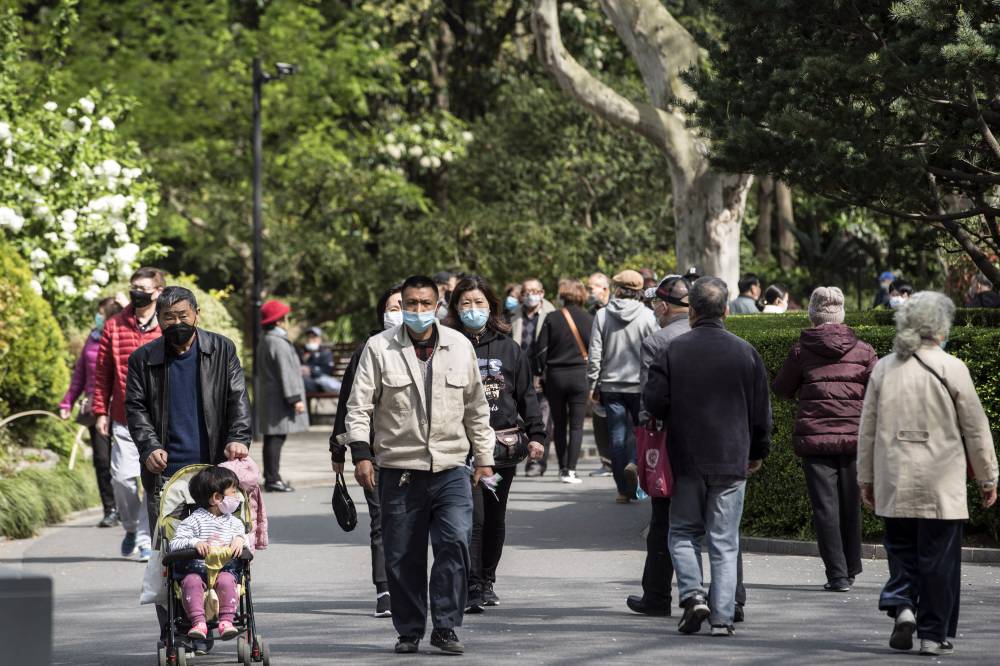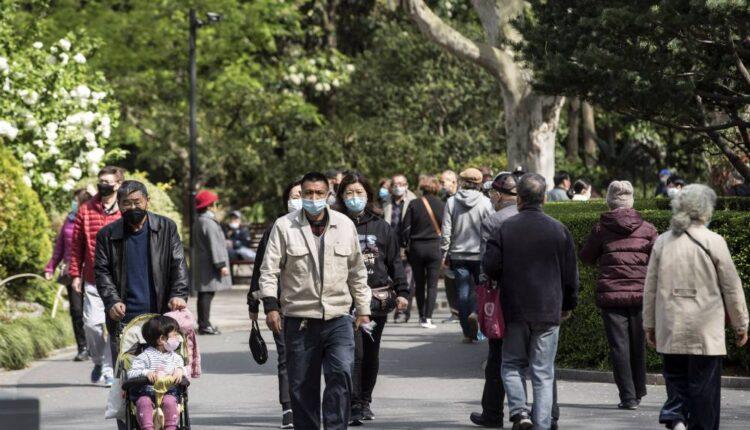
- Japanese Prime Minister Shinzo Abe said fiscal spending under Japan's massive stimulus package to tackle fallout from the coronavirus pandemic will total 39 trillion yen ($357 billion), according to a Reuters report.
- The world may never get back to what is considered "normal," White House health advisor Dr. Anthony Fauci said.
- U.K. Prime Minister Boris Johnson was moved to intensive care as his coronavirus symptoms worsened.
People wearing protective masks walk through Lu Xun Park in Shanghai, China, on Thursday, April 2, 2020.Qilai Shen | Bloomberg via Getty Images
This is a live blog. Please check back for updates.
- Global cases: At least 1,341,907.
- Global deaths: At least 74,476.
- Most cases reported: United States (366,614), Spain (136,675), Italy (132,547), Germany (102,453), and France (98,959).
The data above was compiled by Johns Hopkins University as of 7:45 a.m. Beijing time.
All times below are in Beijing time.
3:05 pm: COVID-19 pandemic may be the breaking point for Hong Kong businesses
In the midst of the coronavirus pandemic, cosmopolitan cities like New York and London have been virtually locked down and streets are empty, but Hong Kong has managed to avoid a complete lockdown even though there's been a steady rise in cases over several months.
Hong Kong reported its first coronavirus case on Jan. 23. Despite the city's high density and a population of more than seven million, it has recorded 914 cases of coronavirus to date, according to data from Johns Hopkins University.
Still, more and more restrictive measures have been in place. Many employees have already been working from home and schools have been suspended, but restaurants and bars have mostly operated as usual — at least until recently. — Uptin Saiidi
2:57 pm: France's lockdown would last for as long as necessary
France's Health Minister Olivier Veran said the country's coronavirus outbreak hasn't reached its peak and that lockdown measures would last for as long as necessary, reported Reuters.
The minister told broadcaster BFM TV that the country is "still in a worsening phase of the epidemic," according to the report. The country has been in lockdown mode since March 17, closing all but essential businesses.
France has registered one of the largest outbreaks in the world. Cumulative cases of COVID-19 in the country have reached 98,984, with 8,911 deaths, according to data compiled by Johns Hopkins University. — Yen Nee Lee
2:30 pm: Germany confirms 3,834 more cases, 173 additional deaths
The number of confirmed coronavirus cases in Germany rose by 3,834 to 99,225, according to the latest data by Robert Koch Institute, a federal government agency responsible for disease monitoring and prevention.
That's the second consecutive day that the country reported fewer than 4,000 cases — down from around 6,000 per day over the last few days, data by the institute showed.
Germany also reported another 173 deaths, taking its tally to 1,607 since the outbreak, showed the data. — Yen Nee Lee
1:21 pm: Thailand reports 38 new cases, one more death
Thailand has confirmed another 38 cases of the coronavirus disease, taking its tally to 2,258, reported Reuters, citing the government's Center for COVID-19 Situation Administration.
The Southeast Asian country also reported one additional death relating to the disease, the report said. That brings Thailand's total fatalities to 27 since the outbreak. — Yen Nee Lee
12:07 pm: Philippines extends lockdown to end-April
Philippine President Rodrigo Duterte has agreed to extend lockdown measures in his country until April 30, reported Reuters.
The measures that restrict movement and gatherings were due to end next week, according to the report.
As of Monday, the Philippines has reported 3,660 confirmed coronavirus cases, according to the country's Department of Health. — Yen Nee Lee
9:55 am: South Korea reports fewer than 50 cases for the second day running
South Korea on Tuesday reported 47 new cases of infection for the second day running. There were six additional deaths.
On Monday, the country reported the same number of new cases — one of the lowest daily reported numbers for the country since late February when the outbreak spread exponentially within its borders.
South Korea has altogether reported 10,331 cases of infection and 192 people have succumbed to the illness caused by the virus, according to data from the Korea Centers for Disease Control and Prevention.
South Korea is generally praised for its efforts to reduce the spread of infection by mass testing its people and adopting strict measures to quarantine and track those who affected. — Huileng Tan
9:13 am: Los Angeles sees slowing growth in coronavirus cases
The city of Los Angeles and all of Los Angeles County both reported the first single-digit percentage point increases since the crisis ramped up in March, the city's mayor, Eric Garcetti, said during a Monday briefing on the local response to the breakout.
The city added 192 confirmed coronavirus cases, bringing the total to 2,851, while the county had 420 new cases for a total of 6,360. The city and county increases were both up 7%.
"Mondays are usually statistically a little bit lower, not as many people working on Sunday, fewer tests. But even with that, this is good news," Mayor Garcetti said. "It shows that what you are doing is working." — Jordan Novet
8:56 am: China reports 32 new cases, no deaths for the first time
China's National Health Commission (NHC) reported 32 new cases, and no deaths as of April 6 — the first time the country posted no deaths since January when it started publishing daily updates.
That brings the country's total to 81,740 confirmed cases, and 3,331 deaths, according to the NHC.
Separately, there were 30 new asymptomatic cases, where people tested positive for the virus but did not show any symptoms.
China started including asymptomatic cases in its daily reports starting April 1. (Updated at 11:29 a.m.) — Huileng Tan
8:20 am: Asia markets jump in early trade
Stocks in Asia jumped in Tuesday morning trade on rising hopes that the spread of the global coronavirus pandemic may have slowed. In Japan, the Nikkei 225 surged 3.09% in early trade while the Topix index gained 2.66%. Over in South Korea, the Kospi rose 2.18%. The S&P/ASX 200 in Australia gained 2.1%.
Data over the weekend suggested the number of daily U.S. coronavirus cases is slowing, although it is still too early to determine a lasting trend. Death tolls in some of the world's coronavirus hot spots, including Spain and Italy, also showed signs of easing. — Eustance Huang
8:10 am: Japan's leader Abe says fiscal spending to battle pandemic will total $357 billion
Japanese Prime Minister Shinzo Abe said fiscal spending under Japan's massive stimulus package to tackle fallout from the coronavirus pandemic will total 39 trillion yen ($357 billion), according to a Reuters report, citing local news agency Jiji.
On Monday, Abe said the government will roll out an economic stimulus package worth 108 trillion yen, equal to 20% of economic output, the report said. Reuters reported that the package, to be confirmed by the cabinet on Tuesday, far exceeds the one compiled in the wake of the 2009 financial crisis totaling 56 trillion yen in size, with fiscal spending of 15 trillion yen. — Weizhen Tan
All times below are in Eastern time.
7:03 pm: White House health advisor Fauci says we will never get back to 'normal'
The world may never get back to what is considered "normal" before the coronavirus emerged in Wuhan, China a little over three months ago and spread to more than 1.3 million people across the world, White House health advisor Dr. Anthony Fauci said.
Fauci, in answering a question about whether the world would get back to normal before a vaccine is approved, said we will gradually be able to "function as a society. But you're absolutely right, if you want to get to pre-coronavirus, that might not ever happen in the sense that the threat is there." COVID-19 has spread to almost every country in the world, killing more than 74,000.
"When we say getting back to normal we mean something very different from what we're going through right now because right now we are in a very intense mitigation," Fauci said. —Noah Higgins-Dunn
6:45 pm: WHO says there's a global shortfall of 5.9 million nurses as world battles coronavirus pandemic
The World Health Organization is urging countries to create at least 6 million new nursing jobs by 2030 to offset a projected "global shortfall" as health-care workers across the world respond to the COVID-19 pandemic.
Nursing is the largest occupational group in the health-care sector, accounting for roughly 59% of health professions, WHO says. There are just under 28 million nurses worldwide, about 5.9 million short of what the world needs to adequately care for the growing population, according to a new report published Monday from WHO, the International Council of Nurses and Nursing Now.
The greatest deficit of nurses is in low- to low-middle income countries in Africa, Southeast Asia, the Eastern Mediterranean region and some parts of Latin America, according to the report, which looked at 191 countries using data between 2013 and 2018.
More than 80% of the world's nurses work in countries that account for half of the world's population, according to the report's findings. —Berkeley Lovelace Jr.
6:39 pm: Trump says there's light at the end of the tunnel with vaccine and treatment research
While the coming days in the nation's coronavirus fight look bleak, President Donald Trump gave Americans some reason to hope. "There's tremendous light at the end of the tunnel," he said at a White House press briefing.
"Currently, ten different therapeutic agents are in active trials and some are looking incredibly successful," he said. "But they have to go through a process and it's going to be a quick process based on what the FDA told me." He said another 15 potential treatments are working toward clinical trials, "so they're advancing rapidly."
Trump echoed comments made earlier Monday by World Health Organization Director-General Dr. Tedros Adhanom Ghebreyesus, who said the research to develop vaccines and treatments to fight the coronavirus has "accelerated at incredible speed."
Tedros said more than 70 countries have joined WHO's trial to accelerate research on effective treatments and "about 20 institutions and companies are racing to develop a vaccine." —Noah Higgins-Dunn
3:15 pm: UK Prime Minister Boris Johnson in intensive care after coronavirus condition 'worsened'
U.K. Prime Minister Boris Johnson was moved to intensive care as his coronavirus symptoms worsened, news outlets reported Monday.
"Since Sunday evening, the Prime Minister has been under the care of doctors at St Thomas' Hospital, in London, after being admitted with persistent symptoms of coronavirus," a spokesman for No. 10 Downing Street said in a statement.
"Over the course of this afternoon, the condition of the Prime Minister has worsened and, on the advice of his medical team, he has been moved to the Intensive Care Unit at the hospital," the spokesman said. "The PM has asked Foreign Secretary Dominic Raab, who is the First Secretary of State, to deputize for him where necessary."
"The PM is receiving excellent care, and thanks all NHS staff for their hard work and dedication," the spokesman added. —Kevin Breuninger
Read CNBC's coverage from the U.S. overnight: Starbucks baristas to wear face masks, US coronavirus cases now number 364,000
Source: cnbc.com

